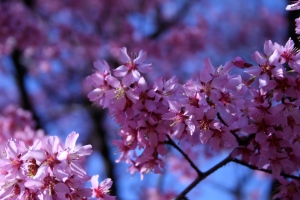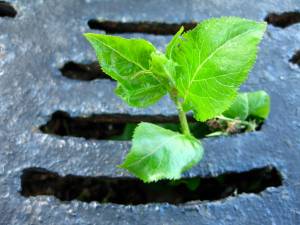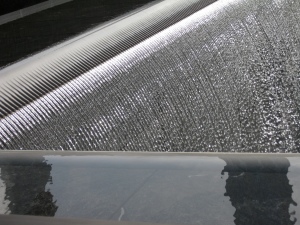Archive
Full
The moon orbits the spinning earth, and in its phases and cycles, seemingly shows us aspects of itself: new, crescent, quarter, full. Although it appears to be changing shape on its journey, the moon is actually reflecting the light from the sun. It is always moving, intact, whole. In truth, the moon is always full.
Sometimes in our search for meaning, we tend to take concepts and symbols apart, and then focus on the parts, and not the whole. A symbol we are all familiar with is the Taoist symbol of the yin yang. The image is a static version of its wholeness. Life is always in motion, always in a process of becoming, and changing. Like the moon, the yin yang is a symbol for change, for motion, for the play of light and shadow. We think of it in halves, and opposites — but it is not day or night, fall and winter. It is all things: day becoming night, fall becoming winter, growth and decay. It is always moving, intact, whole. This is time.
In the richness of Jungian psychology, this concept and its symbols are understood, and utilized, as the anime and animus. The anima is the female aspect present in the collective unconscious of men, and the animus is the male aspect present in the collective unconscious of women. But this energy is not static, neither halves or opposites — male or female, logic or compassion, conscious or unconscious, light or shadow. It is always moving, intact whole. This is being.
Yeats said, “It takes more courage to examine the dark corners of your own soul than it does for a soldier to fight on the battlefield.” Our life path is to realize the self. Not merely to explore and reconcile our light and our shadow, but to awaken what already resides within us. Like the moon, we are reflecting light, serving as mirrors for one another, not static, but reflective, responsive. This is transcendence.
In truth, like the moon, we are always moving, intact, whole, and full.
Toni
One Day I Shall Burst My Bud Of Calm…
To everything, there is a season…except maybe for winter 2012 in New York city. It’s been a mild one. Although spring officially arrived, 3/20 1:14 AM EDT, the warm temps and many blooms made their appearance well in advance of the equinox.
Global warming, Positive Arctic Oscillation? One thing for certain, it’s crazy…and spring, half losing its mind from all of it says, “Bring it on.” It reminds me of this quote by Christopher Fry:
“One day I shall burst my bud of calm and blossom into hysteria.”
Soft and striking Central Park cherry blossoms

Forsythia unfolding in Central Park

Masks
Consider the mask. In the English language, the word for person is derived from the Latin word persona – which translates as “mask”. Masks are a universal part of our human experience. Used in ceremony and in practical purpose, the mask holds social and symbolic meaning. Power and myth.
The Iroquois healing ritual masks invoke the spirits of the dream world with the belief their masks have life. Igbo tribal mask ceremonies connect to ancestors. Shamanic masks of the Chinese Shigong, Hopi, Zuni and Dogon are used in ritual dance. There are the Temne’s masks of wisdom and humility; the Ivory Coast Senoufo tranquility mask with its sleepy eyes and Grebo mask of the proud, unyielding warrior.
Masks of ancient drama and myth teach and entertain, from Greek and Roman amphitheater to India’s Mahabarata and the Noh plays of Japan. There is the ancient iron mask as torture; oxygen mask, life saving; gas mask, protection; and diving mask, clarity. Masks as disguise, to avoid recognition, be anonymous — in crime or carnival.
A great deal is written in psychology as well, on how we wear “masks” in our every day life, as a defense mechanism, hiding a true self behind it. We don the right one for the appropriate situation. Our vulnerability is protected.
You may believe you are the sum of all the masks you wear. Give this some thought: if you hold a mask in front of you, and shine a flashlight between the mask and your face, light would shine through. It would pour through the openings in the eyes, the mouth, it may even appear luminous. Maybe your essence is spirit, and you are that light shining through.
What do you think?
Less Is More: Clean Up Your Sh*t
Bruce Lee said, “It’s not the daily increase, but the daily decrease. Hack away at the unessential.” That quote actually comes from ancient Chinese thought, and you are likely to find it running through the culture stream of any wisdom tradition.
As the weather warms up, we all understand the concept of spring cleaning. Beyond that notion, part of health and well being is to get rid of what you do not need. In the I Ching, the Book of changes, there is hexagram #41: decrease. Sometimes it is called “empty the cauldron”. It is made up of the trigram mountain over the trigram lake. Here’s what’s happening in that pairing: the water evaporates, and though not visible, the moisture nourishes the mountain. It moves deep inside, hidden — yet is fosters new growth.
It is a time not of accumulation, but meaning. What seems to be lost, and in many ways is lost, is ultimately changing. The external gives way to the internal. Maybe its a reduction in your material possessions. Their loss can leave room for something else: perhaps not visible, but felt, and understood. Known only in a way that manifests when you make space for it.
In more modern words — less is more, clean up your sh*t. Cutting through clutter and excess could mean cleaning out a closet, or clearing out your own cobwebs. Streamline efforts in your daily life. Clear a place for deeper exploration of thought or spirit. Is it time to talk less and listen more? Maybe the anger has to go. Or the frustration. Judgment. Jealousy. Self absorption. Self pity. All baggage you do not need to carry. It weighs you down. Hack away at it, let it go. Empty the cauldron. Dissolve, like water into the mountain, and see what grows.
Toni Tan
They Combed Their Hair At Thermopylae
“Human life has always been lived on the edge of a precipice. Human culture has always had to exist under the shadow of something more infinitely important than itself.” — CS Lewis
Life is never without crises. Our daily distractions often allow us to ignore this truth, until something frightening happens and forces our attention. In these difficult times of global crisis, many of us are paying close attention and many more of us are feeling the full force of the blow. Not dealing with crisis is worse. Yet, even in our disillusion, denial and devastation, life goes on. It more than goes on.
Far beyond mere survival, in the worst of times humans explore thought beyond limitations of crisis. We do much more than exist. In his essay on war, CS Lewis wrote of our human history, saying we do not put off cultural activities until disaster is averted or conflict resolved. Waiting until life is without danger to seek out knowledge and beauty is a moment that will never come. We do not wait.
Long before the film 300, Lewis told us that men will conduct metaphysical arguments in condemned cells, propound mathematical theorems in beleaguered cities, and make jokes on scaffolds. The Spartan warriors combed their hair at Thermopylae. Though knowing their death was imminent, these men honored being alive by understanding the importance of what is left behind. This ensures continuity. We honor the evolution of our culture, this is our nature.
In early times, Neanderthals managed their survival. The Cro magnons transcended root needs as their culture emerged. They learned strategy, and by painting tales on cave walls, created art and history. Though for a time the two groups existed side by side, the Neanderthal, held in place by its limitation, died out. Moving past the predicament of survival, early man — the conscious, thinking, creative man, was born.
We are not only resilient, but we have the urge to move into higher and loftier thought. It is the foundation of human progress. Our survival is ensured in our ability to do more than survive. Man is more than the fight. Much more.
Toni




